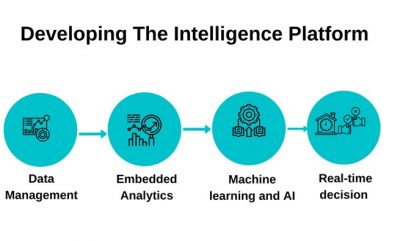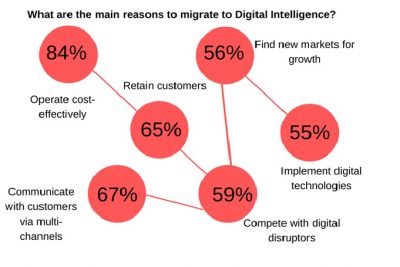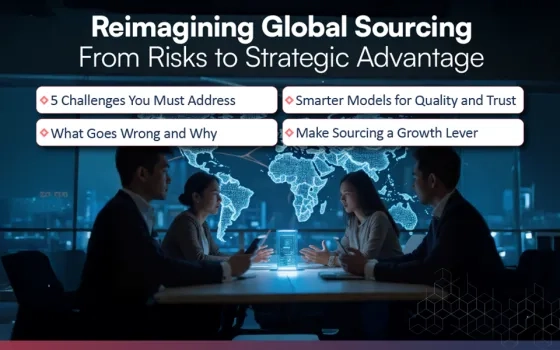Just a few years back, it was hard to find anyone having a serious discussion on Digital Intelligence or Machine Learning outside educational institutions. But today, the scenario is entirely changed. Today, AI is the most commonly used buzzword in the IT industry. The storm of AI and intelligent systems are just knocking the doors. Get ready to watch the most amazing innovative solutions in the coming years. It’s time to get more digitized.
Digital Intelligence Defined
Digital Intelligence involves understanding consumer demands and how they are reacting to the mobile app or website you develop, and then using the data to optimize their experience. Digital Intelligence has the capability to redefine the multi-device era by transforming digital data into real-time actionable insights and customer centric solutions.
The evolution toward digital intelligence to drive customer experience means we need to start to demand more from our data to improve its actionability in the following five ways:
- Digital inputs – collecting data from all digital marketing touchpoints
- Business inputs – using digital marketing data with data related to the business
- Data processing – collecting, integrating, and managing data with high speed
- Data warehouse – storing digital data for analysis and execution
- Analysis – creating dashboards and reports for doing data mining and forecasting
- Action – creating analytical data and real-time insights directly available to the applications that drive interactions
Forrester defined “digital intelligence,” as:
The in-depth analysis of data and management provides a holistic view of the digital customer experience that drives the measurement, optimization, and execution of marketing strategies and business tactics.

The “confused” world Of AI adoption in industries
Business entrepreneurs have been exploring the magical technology named Digital Intelligence for the last few years. And with this, they get various opportunities to develop mind blowing solutions for relieving their customer’s lives.
- From the last few years, the implementation of AI-powered solutions hasn’t gone beyond Proof of Concepts (PoCs) in the form of Machine learning algorithms.
- The PoC projects running presently are using basic statistical methods to add predictions to their analytics solutions and then call it as AI solutions. But, this is called advanced analytics which requires in-depth knowledge and human intervention to understand the outcome and then on the basis of that making a decision.
- The continuous changing business processes, newly created data and the other business factors are decreasing the level of precision and its value.
- The confusing business leaders misunderstood the right way to implement AI technologies so that they could gain valuable results.
The coming years are very crucial to the industry as there is a myriad of incredible technologies to enter into the IT industry. Giant ventures can’t handle the confusion state any more. The facts should be more clear about what Digital Intelligence technology can and can’t do. Also, the way it can be integrated with other technologies to develop brilliant solutions.
| Transform Your Data into Actionable Insights That Give You a Competitive Edge with DIGITAL INTELLIGENCE |
What was once just an imagination for most of us, now becoming reality. Digital Intelligence is affecting our everyday lives in a number of ways. The customer-favoured digital solutions that are enhancing the digital experience of customers are Apple’s Siri, voice recognition, Google search predictions, and weather forecast. The most common thing that made these technologies happen is none other than our very known machine-learning algorithms that enable them to react and respond in real-time.
It will take a lot of time as AI technology evolves slowly, but the positive effect it will have on the society in the coming future is immeasurable.
Digital Intelligence is a combination of-
- Technology and Talent
- Data and Analytics
- Human Intelligence and Machine Intelligence
A Gartner study found that by 2020, AI will eliminate 1.8 million jobs—but create 2.3 million.
| RedefineYour Big Data into Premium Real Business Insights |
How businesses can benefit from Digital Intelligence?
Digital Intelligence helps to give your businesses more agility and scalability. Adding more complex processes to your business will help you gain the intelligent views of your customer experiences.
1. Transforming Machine data into Operational Intelligence
AI and machine learning facilitate you to enhance your decision-making capabilities. It can help you collect and analyze data from all of your siloed systems. This will help you collaborate with your structured and unstructured data together so that you can get the real insights that you need at any time.
2. Analyze data across your entire Technology Stack
The Digital Intelligence applications help you enhance your visibility of data from all platforms comprising public and private clouds. Integrating with your partner’s system helps you gain a 360-degree view of your operations.
3. Optimize your Customer Experience
By leveraging the robust power and capabilities of Digital Intelligence, you can collect information about your customer’s behavior from online digital services and mobile apps all in one place. The data facilitates you to enhance your products, services, apps, and marketing initiatives to meet customer demands.
4. Resolve Critical Issues faster
Today, in the fast running digital pace, businesses need to proactivity monitor systems before they start affecting users. You can enhance speed to resolution by monitoring systems and addressing problems.
Proactive monitoring and response also allow your IT team to spend less time on support and more time on innovation.
Transforming for Efficiency, Customer-Centricity, and Growth
Digitization is the new norm today. Many businesses want to implement digital practices that help them operate more efficiently and cost-effectively, cited by 84% of respondents. Check out what are the reasons behind migrating to Digital Intelligence.

Why does Digital Intelligence matter?
With a robust Digital Intelligence capability, businesses can:
1. Increase brand preference and trust
By attracting and snatching customer attention with improved personalized offers and relevant services improved their experiences to buy and loyalty while reducing rates.
2. Improved revenue
Better customer insight and analytics provide a relevant experience to all digital touchpoints. By enhancing the quality of leads and conversion rates, businesses can also boost opportunities to cross-sell or up-sell products. Consumers have a habit to research and compare offers on financial products before buying. It is critical that financial services tap into the customer context to deliver tailored products and timely promotions.
3. Reduce costs
The improved version of marketing automation that every marketer should know is a Digital Intelligence capability brings, financial services providers can use their resources more productively. More precise promotion targeting reduces marketing spend. Also, consumers receive offers only on products most relevant on them.
Key Takeaways
Existing Digital Analytics Practices Just Aren’t Good Enough- Competing for customers across multi-channels requires levels of sophistication, strategy, and investment that existing digital analytics practices do not deliver.
Digital Intelligence Supports Continuous Optimization- The modern analytics practices must provide firms a clear view of digital customer interactions that supports the continuous optimization of customer experience.
Four Strategic Pillars Support Digital Intelligence- To upgrade digital intelligence to a strategic initiative that provides competitive advantage, customer insight (CI) professionals must consider their technical methodology, functional strategies, metrics and key performance indicators, and testing and optimization approach.
Digital Intelligence is just the start of a digital era.
All in all, we can say, that Digital Intelligence is all about bridging the gap between expectations and outcomes. Good and real insights require good data-and the human expertise to transform those insights into a larger one. With Digital Intelligence, businesses can drive real-time business outcomes, boost revenues, increase profits, breakthrough results, and accelerate growth.



























